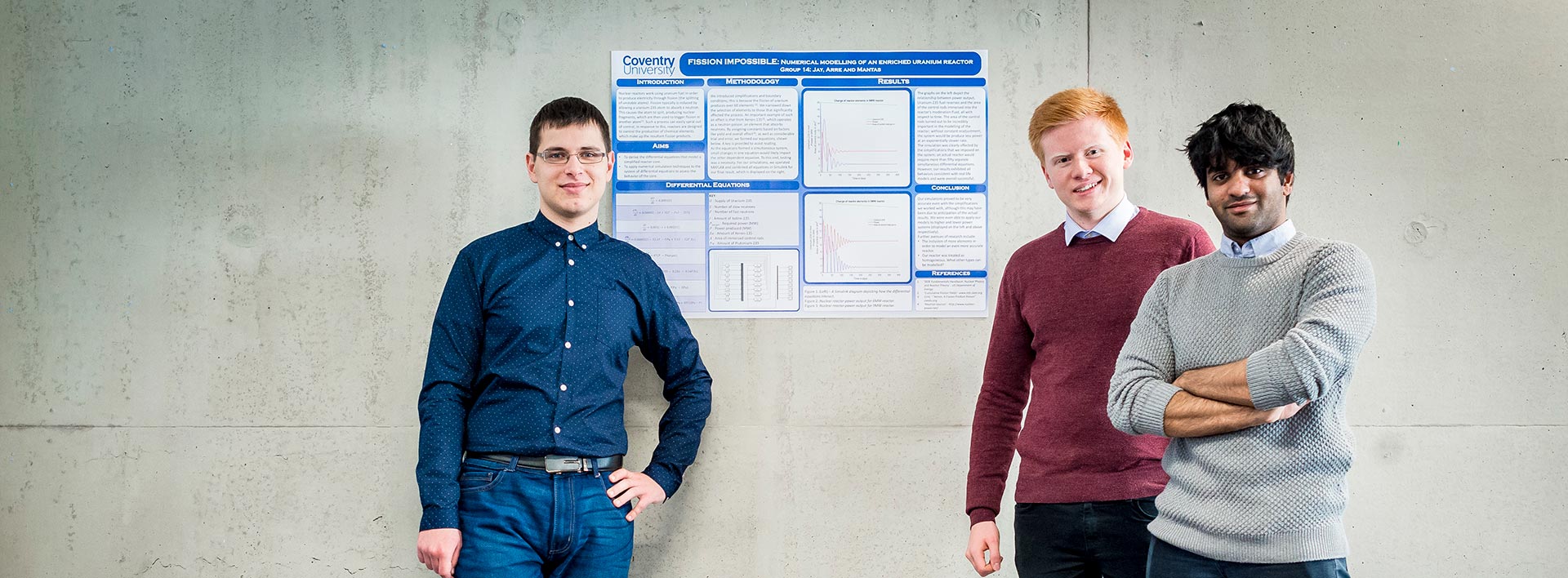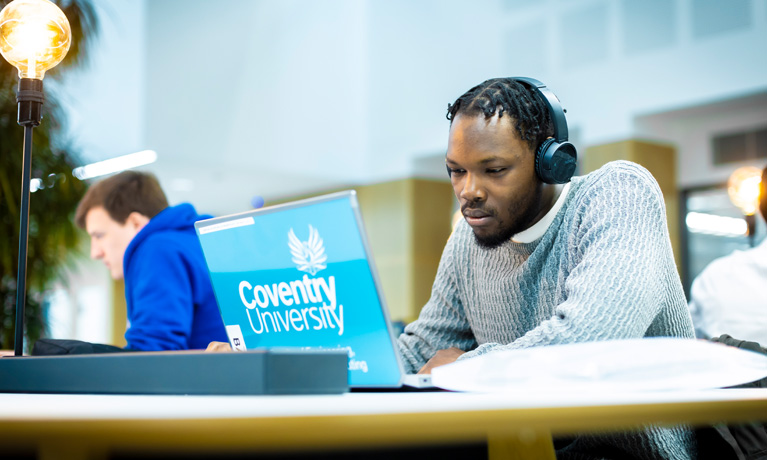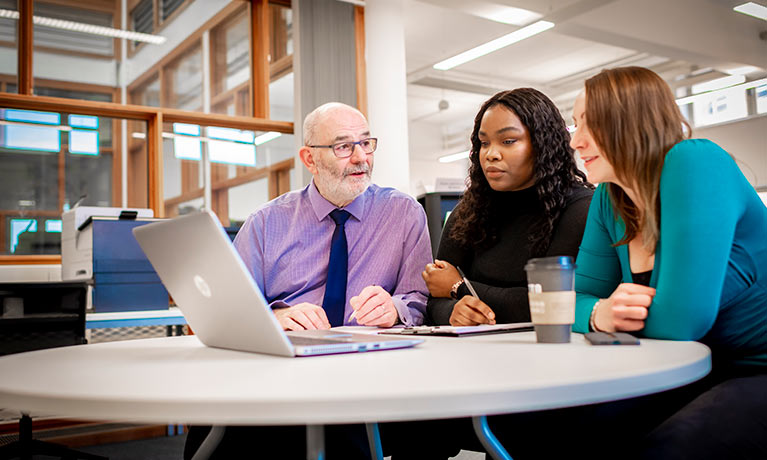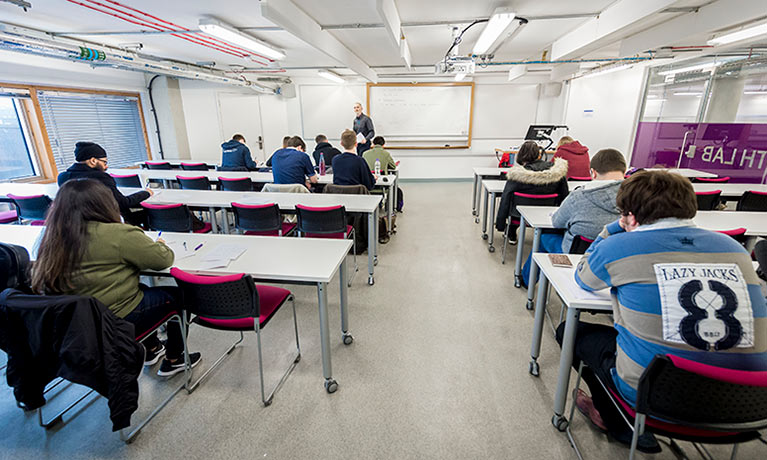Search
Mathematics BSc (Hons)
Study level: Undergraduate
Build your analytical thinking and problem-solving skills by studying both pure and applied mathematics, and the chance to apply your knowledge to challenges and projects the world faces.
Course features
Course option
Year of entry
2026-27
Location
Coventry University (Coventry)
Study mode
Full-time
Sandwich
Duration
3 years full-time
4 years sandwich
UCAS codes
G100
Start date
September 2026
November 2026
January 2027
March 2027
May 2027
July 2027
Course overview
If you're curious about how things work, enjoy logical reasoning or love solving problems, studying pure and applied mathematics could be a great fit. You’ll examine real-world applications, strengthen your critical thinking, analytical and computational skills, and develop knowledge that could support your development in areas such as science, finance, data analytics or technology.
Key highlights
- Core and applied maths: learn to use algebra, calculus and computational tools like Python, MATLAB and R to solve real-world problems.
- Pure mathematics: develop your understanding of abstract theory, proofs and logical reasoning to understand how to apply mathematical methods, why those methods work and how they fit into the broader logical framework of mathematics.
- Career-focused skills: apply your knowledge through problem-solving activities and the use of industry-relevant tools. You may also have the opportunity to undertake a placement2 or work on projects that reflect real-world scenarios.
Rated Gold Overall
Teaching Excellence Framework (TEF) 20235 QS Stars for Teaching and Facilities
QS Stars University RatingsTop 5 Student City in England (Coventry)
QS Best Student Cities Index 2026Why you should study this course
- Tailored learning: in your final year, you'll have the opportunity to choose from a range of optional modules, allowing you to shape your studies around your interests and develop expertise in areas that matter to you.
- Contemporary tools: you'll use mathematical software, AI tools and programming languages to explore and apply mathematical concepts to prepare you for a future where mathematics and computing increasingly intersect.
- Teaching expertise: you’ll be taught by academics who are active researchers in applied mathematics, including areas such as fluid dynamics and complex systems. Their research informs their teaching and project supervision (staff subject to change).
- Independant research project: undertake an individual research project, allowing you to get a deeper understanding of applied or pure mathematics under the guidance of an academic supervisor.
- Career-ready skills: graduate with the mathematical, problem solving and computational skills, which could help you prepare for roles in a wide range of sectors including finance, technology, research and data analysis.
What you'll study
The course has three key themes.
- Core Mathematics forms the foundation of essential techniques.
- Applied Mathematics demonstrates how these techniques can be used to solve real-world problems.
- Pure Mathematics reveals the conceptual underpinnings that both unify the subject and allow for future innovation.
A strong computational element supports analytical methods, enhancing problem-solving through technology and programming.
This course has a common first year.
In the first year, the curriculum is shared across related courses allowing you to gain a broad grounding in the discipline before going on, in the second and third years, to specialist modules in your chosen field.
We want your degree to fit around you, so upon successful completion of your first year, you could swap degrees with another course in your common first year (subject to meeting progression requirements).
Common first year courses
- Data Science BSc (Hons)
- Data Science MSci (Hons)
- Mathematics BSc (Hons)
In the first year, the curriculum is shared across related courses allowing you to gain a broad grounding in the discipline before going on, in the second and third years, to specialist modules in your chosen field.
We regularly review our course content, to make it relevant and current for the benefit of our students. For these reasons, course modules may be updated.
How you'll learn
Learning will be facilitated through a variety of methods which may include lectures, seminars, lab, workshops, online activities and group work.
Students are expected to engage in both class and online activities and discussions. This course also requires students to participate in additional guided reading and self-directed study to reinforce the learning gained from timetabled sessions.
Formative feedback will be used to prepare students for summative assessment and give students an early indication of their progress towards the module's intended learning outcomes. A portion of this module’s contact time will be dedicated to course support sessions. The course support sessions are timetabled sessions where students can explore areas of the course which they find challenging or get support with personal projects and employability efforts (subject to availability).
Teaching contact hours
As a full-time undergraduate student, you will study modules totalling 120 credits each academic year. You will normally study one 30-credit module at a time. A typical 30-credit module requires a total of 300 hours of study made up of teaching contact hours, guided and independent study.
Teaching hours
Teaching hours may vary depending on your year of study and selected modules. During your first year, you can expect 12-15 teaching hours each week. You will also have the option to attend additional sessions, including time with a progress coach or to meet with staff for advice and feedback. As you progress through your studies, teaching hours may reduce.
Guided and independent study
Throughout your studies, you will be expected to spend time in guided and independent study to make up the required study hours per module. You’ll be digging deeper into topics, review what you’ve learned and complete assignments. This can be completed around your personal commitments. As you progress through your studies, you’ll spend more time in independent study.
Online learning
As an innovative university, we use different teaching methods including online tools and emerging technologies. So, some of your teaching hours and assessments may be delivered online.
Assessment
This course will be assessed using a variety of methods which will vary depending upon the module. Assessment methods may include:
- formal examinations
- phase tests
- essays
- group work
- presentations
- reports
- projects
- coursework
- individual assignments.
The Coventry University Group assessment strategy ensures that our courses are fairly assessed and allows us to monitor student progression towards achieving the intended learning outcomes.
International experience opportunities
If you have a desire to gain international experience, there are opportunities2 to spend a year studying abroad. In the past, students have chosen to study Mathematics in St Marcus University in California, University of Malta, Stockholm University in Sweden, also universities in the Netherlands, Germany and Australia. Courses in all these Universities have been delivered in English.
The opportunity for a sandwich placement means we aim to support you in finding an internship and in seeking ways to finance that experience. Past students have gone to work in countries such as Malaysia, Belgium, and Spain.
Please note that all international experience opportunities may be subject to additional costs, competitive application, availability, and meeting applicable visa and travel requirements, and are therefore not guaranteed2.
Entry requirements
Typical entry requirements:
Not got the required grades? We offer this degree with an integrated foundation year.
Fees and funding
| Student | Full-time | Part-time |
|---|---|---|
| UK, Ireland*, Channel Islands or Isle of Man | 2026/27 fees TBC 2025/26 fees: £9,535 per year |
Not available |
| EU | 2026/27 fees TBC 2025/26 fees: £9,535 per year with EU Support Bursary** 2026/27 fees TBC 2025/26 fees: £18,300 per year without EU Support Bursary** |
Not available |
| International | 2026/27 fees TBC 2025/26 fees: £18,300 per year |
Not available |
If you choose to study this course with a professional placement2 or study abroad year, you will need to pay a tuition fee3 to cover your academic support throughout your placement year. Students commencing their professional placement in the academic year 2027/28 will pay £1,500 if they are paying UK fees, or £1,800 if they are paying international fees.
For advice and guidance on tuition fees and student loans visit our Undergraduate Finance page and see The University’s Tuition Fee and Refund Terms and Conditions.
The University will charge the tuition fees that are stated in the above table for the first Academic Year of study. The University will review tuition fees each year. For UK (home) students, if Parliament permits an increase in tuition fees, the university may increase fees for each subsequent year of study in line with any such changes. Note that any increase is expected to be in line with inflation.
If you choose to study this course with a professional placement, the University will charge the tuition fees stated above for those on a placement during Academic Year 2027/28. The University will review professional placement tuition fees each year. For UK (home) students, the University may increase fees for each subsequent year of study, but such that it will be no more than 5% above inflation.
For international students, we may increase fees each year, but such increases will be no more than 5% above inflation. If you defer your course start date or have to extend your studies beyond the normal duration of the course (e.g. to repeat a year or resit examinations) the University reserves the right to charge you fees at a higher rate and/or in accordance with any legislative changes during the additional period of study.
We offer a range of International scholarships to students all over the world. For more information, visit our International Scholarships page.
Tuition fees cover the cost of your teaching, assessments, facilities and support services. There may be additional costs not covered by this fee such as accommodation and living costs, recommended reading books, stationery, printing and re-assessments should you need them. Find out what's included in your tuition costs.
The following are additional costs not included in the tuition fees:
- Any optional overseas field trips or visits: £400+ per trip.
- Any costs associated with securing, attending or completing a placement (whether in the UK or abroad).
*Irish student fees
The rights of Irish residents to study in the UK are preserved under the Common Travel Area arrangement. If you are an Irish student and meet the residency criteria, you can study in England, pay the same level of tuition fees as English students and utilise the Tuition Fee Loan.
**EU Support Bursary
Following the UK's exit from the European Union, we are offering financial support to all eligible EU students who wish to study an undergraduate or a postgraduate degree with us full-time. This bursary will be used to offset the cost of your tuition fees to bring them in line with that of UK students. Students studying a degree with a foundation year with us are not eligible for the bursary.
Facilities
The School of Computing, Mathematics and Data Science is based in the Engineering and Computing Building, and the attached Beatrice Shilling Building. Both buildings are high-specification learning environments that benefit from extensive social learning facilities, well-appointed laboratories, lecturing facilities and classrooms, facilitating our innovative teaching methods across a diverse suite of undergraduate and postgraduate courses.

Digital Literacy Centre
The Digital Literacy Centre provides a range of help and support for digital, programming, and IT skills. From programming to email etiquette, from Word and Excel to enhancing your Google-Fu, the DLC provides a range of online and in person help and support. Students can make use of drop-in sessions or book one-to-one appointments online and face to face.

sigma Centre
The sigma Centre is a mathematics support centre, which provides a wide range of learning resources in mathematics and statistics. Students can make use of drop-in sessions or one-to-one appointments (subject to availability).

Mathematics laboratory
Set out like a traditional classroom with a large whiteboard at the front and a social space for brainstorming at the back, it is the only teaching room in the Frank Whittle Building laid out in this way, designed to suit the teaching style required for this subject.
Facilities are subject to availability. Access to some facilities (including some teaching and learning spaces) may vary from those advertised and/or may have reduced availability or restrictions where the university is following public authority guidance, decisions or orders.
Careers and opportunities
On successful completion, you will have knowledge of:
- the logical construction of a mathematical argument
- the application of mathematics to construct models and their resolution, with an appreciation of the validity of the model and the use of approximation
- the use of a range of analytic and descriptive techniques
- the strengths and weaknesses of selected mathematical software and selected programming or scripting languages and their use to extend capabilities
- a range of real-world applications of mathematics.
On successful completion, you will be able to:
- understand, reproduce, and generalise logical mathematical reasoning
- organise and interpret information and results from mathematical models
- analyse problems and construct an appropriate formulation and solution with relatively little guidance or support
- use specialist modern information technology packages and a programming language confidently
- use a wide range of information resources to acquire relevant information.
Studying maths develops skills in logical thinking and strategic knowledge, demonstrating to employers your advanced numerical and analytical ability, both of which are rare and in demand on the graduate job market.
A mathematics degree opens a range of career opportunities in industry, accountancy, banking, computer analysis, marketing, industrial design, management, and scientific research. You could be employed in a variety of roles, for example, as an actuarial analyst, actuary, forensic accountant, operational researcher, research scientist, teacher, statistician, or stockbroker.
Where our graduates work
Previous students have worked as:
- Financial Analysts at IBM
- Gaming Financial Analysts for Warner Bros
- Finance Assistants at Scottish Power
- Business Performance Process Analysts at National Grid
- Power Analysts at E.ON
- Customer Service Analysts for Cummins.
Others have also used their qualifications to progress into teaching careers, as well as postgraduate study to obtain MSc, MPhil, and PhD qualifications.
The graduate destinations listed above illustrate potential career paths. You may need to gain additional qualifications or practical experience, pass professional examinations, complete training, cover associated costs and meet specific visa or immigration requirements to secure employment in these fields.
Further study
You may decide to pursue postgraduate study opportunities by studying courses such as Data Science MSc. You may be entitled to an alumni discount on your fees if you decide to extend your time with us by progressing from undergraduate to postgraduate study.

Discover Phoenix+
Phoenix+ brings you together with other students to learn, experience and develop essential knowledge and skills. Whatever destination you choose, it's about preparing you for life after university.
Learn more about Phoenix+




